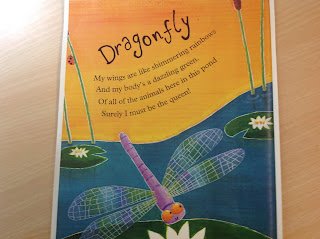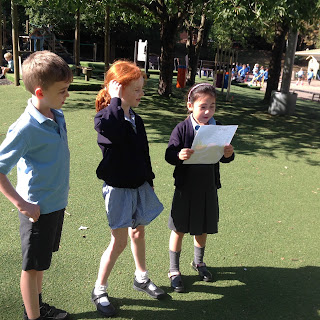This week in English we have been focusing on poetry. We read a range of poems by Giles Andreae
in an anthology called ‘Mad About Minibeasts’.
We talked about what we liked and disliked
about the poems. Our ideas included
rhyming words, alliteration and words chosen carefully for effect.
I like ______ poem
because …….
My favourite part
of the poem is the part where
I don’t really like
______ because……
On Thursday we read and performed the poems by Giles Andreae in groups of three. We added
actions and used intonation in our voices to make it more interesting for the
audience.
On Friday we did an activity to help develop the children’s
vocabulary. They had a picture of a minibeast and had to think of the best
words or phrases to describe it. Here
are some of our ideas. When you have
an adjective, adjective, noun it is called an expanded noun phrase. We will be using this expression a lot
throughout Year 2.
You could repeat this
activity at home with your child and would love to see some of the words they
came up with.
Can your child identify the nouns and adjectives in this list?
Can your child think of two different adjectives to improve this sentence?
Next week we will be writing our own minibeast poems using many of the words we have found this week. Ask your child what their favourite word was.
Home learning
You may like to read
some poems with your child and use the
writing frame above to discuss the
poems after reading them. Also as they read can they use some intonation in
their voice to make the meaning of the poem clear.
Please send in any
poems about minibeasts to add to our class anthology.
This week in phonics – we recapped the digraph ai, ay, a-e. |
Spellings
Over the next few weeks please ensure your child can spell the Year One common exception words.
Over the next few weeks please ensure your child can spell the Year One common exception words.
This week in maths, we have been counting,
reading and writing numbers to 100. We have been practising counting forwards
and backwards in ones from any number. Some of us find ‘crossing the tens’
tricky (i.e. 70 – 69, 60 – 59 etc.), please practise counting backwards from any number at home.
On
Monday we started by selecting a number and then making that number using a
variety of resources. This helps us check the children’s understanding of
numbers. For example, knowing that 67 is made of 6 tens and 7 ones. Some of us
challenged ourselves to make 5 more than the given number. Here are some photos
of the ways we made numbers.
The next day we practised reading numbers
to 100 by playing ‘Splat the Square’. https://www.primarygames.co.uk/pg2/splat/splatsq100.html
We discussed how we know that, for example, 54 is not 45, by
looking at the tens and ones. We then read numbers written in words. We used
our phoneme fingers to help us. We then worked as a group to match numerals and
words.
The next day we started by listening to a
‘Numbers to Ten’ story and we wrote the numbers in words as we heard them. We
then played ‘Splat the Square’ again, but this time discussed how we write the
numbers in words. We thought about different strategies we could use. For
example, the word ‘four’ has four letters and ‘eight’ is spelt the same as ‘light’,
but with a different letter to start. We then extended this to numbers to one
hundred. We discussed how we add ‘ty’ to the end of words such as ‘seven’ to
make ‘seventy’. We rolled dice to make 2-digit numbers and recorded these in
our books. We then wrote the number in words, using a word bank to help us, if
needed.
Please
help your child learn to write all numbers to one hundred in numerals and
words.
This
week in art we were using clay. In this
first lesson we explored what we could do with the clay. First we pulled,
pinched, rolled the clay into a round ball and a long sausage shape, coiled it
and flattened it.
Next we used tools to make marks.
Finally we used slip (slippery,
watery clay) to attach two pieces of clay together.
We have had a very busy week and we hope
you all enjoy a restful weekend!
The Year Two Team


































